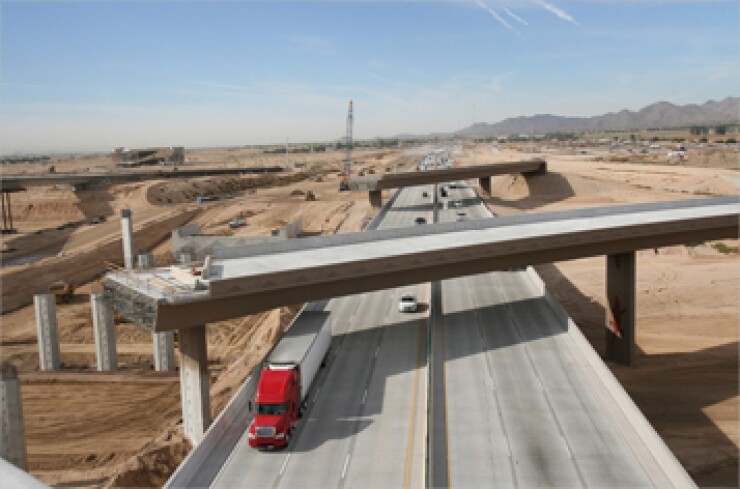
DALLAS — Arizona counties are organizing a 2014 effort to restore local highway and road funds lost during the budget crises of the past five years.
Since 2008, the Arizona Legislature has diverted more than $314 million from municipal and county road building and maintenance to fund state government operations, according to the County Supervisors Association of Arizona.
In addition to filling gaps in the general fund budget, revenues originally earmarked for road projects have gone toward operations of the Department of Public Safety.
To finance local highway projects, Arizona's 15 counties leverage the Highway User Revenue Fund (HURF), made up of tax revenues from gasoline sales, commercial truck permits and vehicle licensing and registration.
The fund is expected to generate about $1.2 billion in the current fiscal year, but the counties don't know how much of that they will see.
Over the past 10 years, the legislature has swept $668 million from HURF to support the state budget, according to figures from the League of Arizona Cities and Towns. Included were $337 million from the State Highway Fund, $204 million from cities and towns and $127 million from counties, the league's figures show.
With the Legislature now facing budget surpluses instead of deficits for the first time since the Great Recession, local governments see an opportunity to restore at least some of the HURF funding.
"Restoring HURF is a top priority for our organization going into the next legislative session," said Craig Sullivan, executive director of the County Supervisors Association. "The counties have been very engaged, and we think lawmakers are listening."
A major question in budgeting when the legislature returns Jan. 13 is what impact the loss of a temporary 1-cent sales tax increase will mean, Sullivan said. Gov. Jan Brewer convinced lawmakers and voters to approve the temporary tax increase in 2010 when the state faced deep cuts in education and other programs without a new source of revenue.
"We'll know more after the new year," Sullivan said. "What we're picking up on is there is some concern that the state just lost the temporary sales tax, so that leads to a revenue shortfall. So legislators are trying to insure structural balance over the three-year time horizon."
Chuck Coughlin, a lobbyist who represents the city of Yuma, the Arizona Department of Transportation, the Associated General Contractors of Arizona and other stakeholders, recently told the Yuma City Council that in 2014 an organized push could pay off.
In May, Pima County Supervisors voted 4-1 in favor of a resolution calling on the state legislature to approve a 10-cent increase in the fuel tax.
Pima County administrator Chuck Huckelberry has been particularly outspoken on the issue, going so far as to advocate a voter referendum with provisions that would prevent diversions to non-highway uses.
Sullivan said that his organization is not directly following Pima County's cue but is encouraging the county's officials to keep the issue in the minds of lawmakers and Gov. Brewer as she prepares her budget proposal in early January.
"I think the discussion is going to be very robust," Sullivan said.





